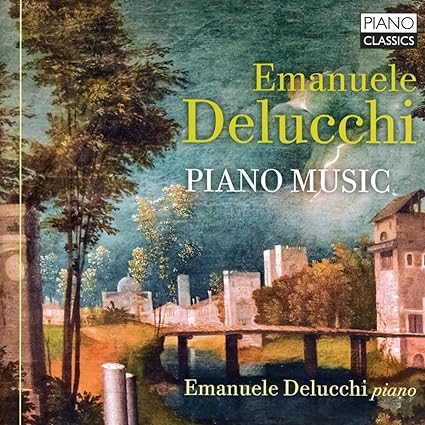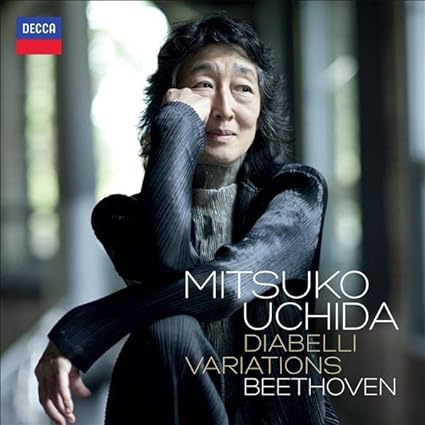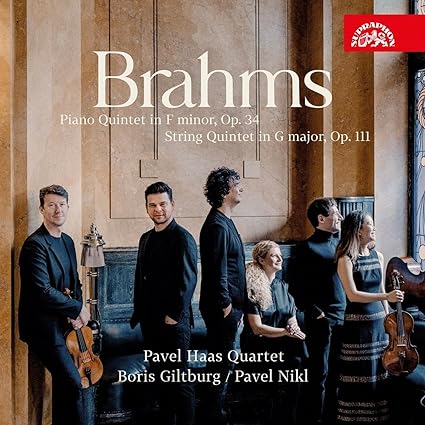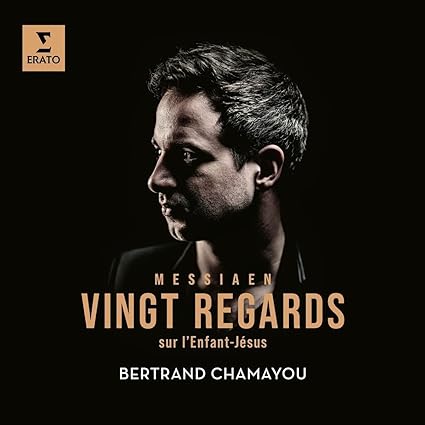You are using an out of date browser. It may not display this or other websites correctly.
You should upgrade or use an alternative browser.
You should upgrade or use an alternative browser.
The classical what are you listening to now ? thread.
- Thread starter TheDecameron
- Start date
Todd A
pfm Member

After reading Jed Distler's review, I had to stream this one. Delucchi combines original compositions and original transcriptions of Schubert, Tarrega, Monteverdi (!), and Gesualdo (!!) and plays the results himself, on some older pianos. His original compositions sound decidedly contemporary, in a purposely backward looking way, but they are more nuanced and intricate than is often the case for new piano compositions. Good as they are - and the Ricercare III is a highlight - it is the Monteverdi and especially the Gesualdo transcriptions that really stand out. They left me wanting more. Kit Armstrong worked magic updating Byrd and Bull for modern grand, and now Delucchi does something similar. I'm thinking big swathes of Renaissance and early Baroque music need to be transcribed to modern grands, or somewhat aged but glorious sounding modern grands, as here. Delucchi's other piano recordings don't really pique my interest, though I think I'll give the Bach/d'Albert transcription a try just because, but given his composing and his playing ability, I certainly hope he records more core rep and that he explores nooks and crannies via transcriptions.
Todd A
pfm Member

Mitsuko Uchida’s pianism has never really worked for me. There is absolutely no questioning her pianistic ability. She belongs to the elite of the elite in terms of pretty much every aspect of playing. On record she delivers what she wants to deliver, or at least that has been the case in what I have heard. It’s just that what she delivers doesn’t click. Which seems strange. I generally prefer strongly individual pianists, ones who highlight specific aspects of well-known scores and who inject personal touches aplenty. Uchida does that. But for me, she often just sounds fussy. Even that is not a problem, really. András Schiff’s earlier recordings often sound fussy, but I adore his fussiness. All that’s OK. I don’t have to like everything. To be sure, her late Beethoven sonatas are pretty good, and her concerto cycle with Simon Rattle surprised me a bit with its overall musical quality. But nothing prepared me for this.
One hears what’s special about this recording in the opening bars of the theme. Uchida’s control of dynamics approaches Volodosian quality, and it remains throughout the work. Her ability to perfectly move from piano to forte in a smooth, perfectly controlled fashion, almost as though a perfect volume control is being used, amazes. And it ain’t no studio trick. She does it all the time throughout the recording. That’s just one trick. Another is her perfect delivery of sforzandi. She’ll cruise along playing in lovely, rounded fashion, then blam!, her playing hits the listener right between the eyes. Each time, every time, start to finish in the work. Damn, damn, damn.
Uchida’s super-fine tempo control and rhythmic delivery may be better yet. She delicately front-loads or back-loads phrases to perfection, applying the minutest accelerations or decelerations to giddiness inducing effect. An early culmination of this is the sixth variation, which undulates in a way such that one starts to bob one’s head to the left hand playing only to be pleasantly interrupted by the right hand playing. In the ninth variation, as she reaches the first climax and then abruptly and flawless backs off, one can’t help but silently (or not) say “woo”. Uchida follows that up with a most playful yet serious tenth variation, perfectly measured, not sounding spontaneous, but not sounding not spontaneous.
Then things get even better as her fussiness manifests itself in a gloriously micromanaged eleventh variation, where each individual note sounds absolutely flawless. Lucky number thirteen, with its ridiculous pauses and thundering notes alternating with gentle playing, sounds informed by Opp 106 and 126. I mean, yeah. The refined to the Nth degree rough playing of the sixteenth and seventeenth variations charms in a faux gruff manner, and the latter presents a dilemma to the listener – follow the left hand or the right hand more closely? The obvious answer is to listen again.
The twentieth variation, in its serenity and depth, reminds the listener that this is late Beethoven, and the Notte e giorno faticar variation sounds so exaggerated yet so controlled that one can’t help but be amused at its humor or notice its spiritual connection to the second movement of 31/1. The late LvB soundworld reappears in force in the twenty-fourth variation, which reminds the listener of the Bachian/Handelian passage in the slow movement of Op 126. And that left hand playing in the twenty-sixth variation! The great, slow Largo (number thirty-six) stands as the apotheosis of late-LvB soundworld music in this recording, approaching Op 110 levels of rarefication. The final variation almost seems to be Beethoven reminding everyone that he was at the time the master of the art of fugue. The way Uchida rumbles out the lower register playing makes one blurt out, if only in one’s head, YES!! To end things, she replays the theme with such delicacy and tenderness, particularly in the melody, that one sits transfixed, almost ready to spring to one’s feet and offer a standing ovation.
The theme and every variation have so much to hear, so many felicitous little touches, that it nearly overwhelms the listener. What it most certainly does do is act as a stimulant at least equivalent to a couple shots of espresso. The playing demands the utmost attention. The mind mustn’t wander. It cannot wander. It must focus.
Uchida’s recording of the Diabelli Variations is, by some distance, her greatest recording, and it stands as one of the greatest recordings of the work. Of course such a proclamation is heavily influenced by early enthusiasm, so I will revisit this recording in the coming months, and years, to see if it holds up. I strongly suspect it will.
Were I to pick a nit, and I shall, it has nothing to do with the recording. The liner note photo of her smiling doesn’t work. There, there’s my gripe.
Perfect sound.
Perfect recording.
rough edges
Sapere Aude

First listen. I have high expectations for every Pavel Haas Quartet release, and they deliver every time. They do so here. Both recordings boast vitality aplenty, superb ensemble playing, vigorous attacks by the strings, and the resonant recording allows for satisfying dynamic range with an almost palpable sense of music swelling to fill the room, especially in the Piano Quintet. (This requires listening at immoderate volume, which is highly recommended.) More listens are needed to confirm, but all indications are that this will be a purchase of the year.
I have also become somewhat of a PHQ collector, and your post prompted me to order this disc. It arrived just a few days ago, and I’ve already listened to it numerous times. Your description is spot on, so thanks for the great heads up, Todd.
Todd A
pfm Member

Listening was split into two sessions for this new release.
The first session was devoted to the five homages to Messiaen by five different composers. Four are nice, and the Harvey is blah. (I can just spin some Nancarrow player piano works to get more musical satisfaction.) The Kurtag is quite nice - so nice that its brevity counts against it. Head and shoulders above the others is the Tristan Murail piece. It really sounds magnificent. Three of my favorite living pianists - Schuch, FFG, and now Chamayou - have all recorded some of Murail's music, and all superbly. I should probably investigate the composer's work more thoroughly sometime soon. Mr Chamayou dispatches the pieces at a Chamayou level.
The second listening session was the main attraction. The first-listen assessment must be split into three categories. First is sonics. This is probably the best sounding recording of the work I've heard. The only sonic peers I can immediately think of are the recordings from Markus Bellheim and Momo Kodama.
Second is the piano playing as piano playing. I have heard no better played version. Chamayou is a lion of the keyboard, and just as he used his monster technique to deliver one of the very greatest renditions of Liszt's Transcendental Studies in blazing and unabashedly virtuosic fashion, he does so here.
Third is the interpretation. It is magnificent. Definitely on the fast side overall, Chamayou does not skimp on depth where needed, and he rips through the knottiest music with seeming ease. He also presents some music uniquely. Regard des Anges stands out in this regard. Overall, there are some potent alternatives. There's the younger Serkin's version lurking out there, and Beroff's. So too are there the aforementioned Bellheim as well and the very different Knapik. And then there's Jean-Rodolphe Kars, in a one-of-a-kind, one take live recording, where the work radiates genuine spirituality. I'm wondering if I can do a series of comparisons of this work.
Jim Audiomisc
pfm Member
The Solent by Vaughan-Williams. Albion CD.
Barrymagrec
pfm Member
Wagner - Parsifal, Opera north on R3
rough edges
Sapere Aude
Beethoven Piano Concertos /Klemperer/Barenboim EMI
Tantris
pfm Member
T S Eliot, The Wasteland - a new production on Radio 3 this evening. This poem has resonated with me since I first read it as a teenager, and I've progressively begun to understand it a little better over the years. This R3 production is excellent, and I'm seeing some sections in an entirely new light. Highly recommended.
davidjt
pfm Member
The Spring and Kreutzer sonatas by Zehetmair and Frager: I can't locate the cd & liner notes atm but Frager is playing a 'period' instrument - presumably one of the early forte pianos. I have several 'classic' recordings, but (today, anyway) this particular combination seems just about perfect.
(And it's not just relief from the ubiquitous Steinway.)
(And it's not just relief from the ubiquitous Steinway.)
Tantris
pfm Member
The Modigliani Quartet in Schubert’s string quartet No 15, D887, from the Schwarzenberg festival earlier this year. Very good indeed, albeit not quite at the rarefied level of some of the reference recordings of this piece. But who’s complaining - Schubert’s music from this period is utterly enthralling.
Joe Hutch
Mate of the bloke
Beethoven String Quartets: Belcea Quartet
Disc one of an 8 disc set of the complete Quartets. So far, so good, but I haven’t got that many to compare (from memory I have complete sets by the Alban Berg Quartett and Amadeus Quartet, plus selections by the Italian Quartet and the Juilliard Quartet).
Disc one of an 8 disc set of the complete Quartets. So far, so good, but I haven’t got that many to compare (from memory I have complete sets by the Alban Berg Quartett and Amadeus Quartet, plus selections by the Italian Quartet and the Juilliard Quartet).
The Belcea set is very very good IMO. Qobuz were giving the MP3 set of it away for free a few years ago..... excellent sound despite only being MP3.
Indeed - warm and lively playing. I prefer it to the Takacs set which is one of the usual recommendations.
rough edges
Sapere Aude
Beethoven Symphonies (complete) with the Czech Philharmonic Orchestra under Paul Kletzki on Supraphon. This set should be much better known than it is…


